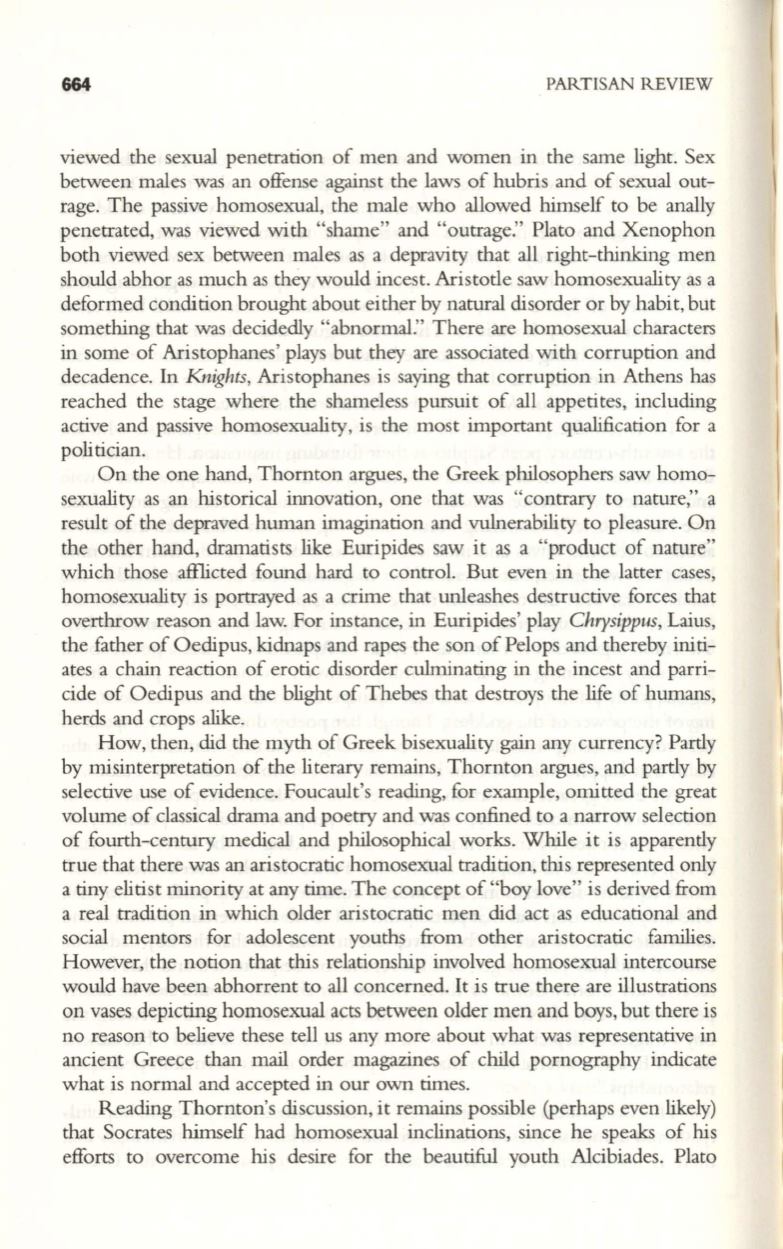
664
PARTISAN REVIEW
viewed the sexual penetration of men and women
in
the same light. Sex
between males was an offense against the laws of hubris and of sexual out–
rage. The passive homosexual, the male who allowed himself to be anally
penetrated, was viewed with "shame" and "outrage." Plato and Xenophon
both viewed sex between males as a depravity that all right-thinking men
should abhor as much as they would incest. Aristotle saw homosexuality as a
deformed condition brought about either by natural disorder or by habit, but
something that was decidedly "abnormal." There are homosexual characters
in
some of Aristophanes' plays but they are associated with corruption and
decadence. In
Knights,
Aristophanes is saying that corruption in Athens has
reached the stage where the shameless pursuit of all appetites, including
active and passive homosexuality, is the most important qualification for a
politician.
On the one hand, Thornton argues, the Greek philosophers saw homo–
sexuality as an historical innovation, one that was "contrary to nature," a
result of the depraved human imagination and vulnerability to pleasure. On
the other hand, dramatists like Euripides saw it as a "product of nature"
which those afflicted found hard to control. But even in the latter cases,
homosexuality is portrayed as a crime that unleashes destructive forces that
overthrow reason and law. For instance,
in
Euripides' play
Chrysippus,
Laius,
the father of Oedipus, kidnaps and rapes the son of Pelops and thereby initi–
ates a chain reaction of erotic disorder culminating
in
the incest and parri–
cide of Oedipus and the blight of Thebes that destroys the life of humans,
herds and crops alike.
How, then, did the myth of Greek bisexuality gain any currency? Partly
by misinterpretation of the literary remains, Thornton argues, and partly by
selective use of evidence. Foucault's reading, for example, omitted the great
volume of classical drama and poetry and was confined to a narrow selection
of fourth-century medical and philosophical works. While it is apparently
true that there was an aristocratic homosexual tradition, this represented only
a tiny elitist minority at any time. The concept of "boy love" is derived from
a real tradition in which older aristocratic men did act as educational and
social mentors for adolescent youths from other aristocratic families.
However, the notion that this relationship involved homosexual intercourse
would have been abhorrent to all concerned.
It
is true there are illustrations
on vases depicting homosexual acts between older men and boys, but there is
no reason to believe these tell us any more about what was representative in
ancient Greece than mail order magazines of child pornography indicate
what is normal and accepted
in
our own times.
Reading Thornton's discussion, it remains possible (perhaps even likely)
that Socrates himself had homosexual inclinations, since he speaks of his
efforts to overcome his desire for the beautiful youth Alcibiades. Plato


